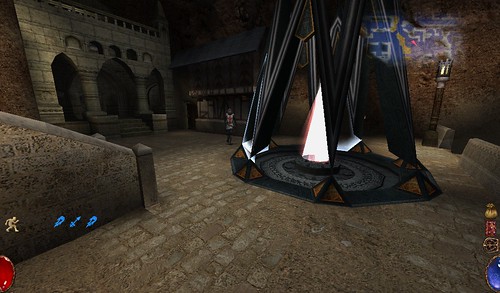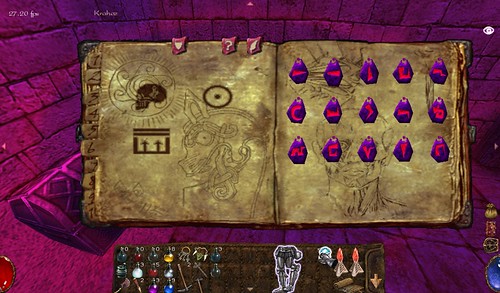This is a guest post by user Hythlodaeus, discussing GPLed video game engine reimplementations, and presenting several projects related to the topic.
I thought I should take some time to discuss in detail one form of project that has been sometimes featured here, on
FreeGamer, and is generally quite popular in the FLOSS gaming world: engine rebuilds / re-implementations.
Rather than being wholly original projects or Intellectual Property-free clones of more popular games, engine rebuilds (also known colloquially as “engine clones”) are essentially an attempt to completely reconstruct and improve upon the features of a given original game, without going trough the trouble or replacing original game art assets and without creating a new whole, free-of-restrictions and copyrights IP. Thus, engine rebuilds merely reproduce the rules, mechanics, and game logic of the original game, while still being dependent on some other form of original data.
These projects frequently arise as a form of preservation: the need to ensure and expand compatibility of a proprietary game out of its original borders, and to make sure the target game will not only be able to run on future systems, but also to be ported to different platforms where it wasn't originally available, without damaging the profits of the original developers or breaking any form of copyright. Better than that, engine rebuilds are a great way to fully enjoy many video game classics in a purely free-as-in-freedom environment, while still rewarding the original developers by purchasing the original game. As of now, I have four particular projects under my radar which I would like to talk to you about.
VCMI
VCMI is an engine re implementation of New World Computing's turn-based strategy classic,
Heroes of Might and Magic 3. It aims to replicate the original game, and introduce many new features that will make it a more pleasant and customizeable experience, as well as providing a platform for scenario building, mod making, and even the creation of completely new games.
VCMI has also been noted for its portability outside of the desktop computer environment, with some developers outside of the main dev team apparently creating an
Android port, and other similar mobile versions.
With the recent release of version 0.90, and bordering closer and closer to the 1.0 release, VCMI is the brightest hope for the huge
Heroes of Might and Magic fan community which still holds HOMM3 as its all-time favorite game in this long-running series, and whose official releases and reeditions tend to run poorly on modern operating systems, including Windows.
FreeSynd
The second project is the Syndicate reconstruction known as
FreeSynd. For those that are too young to have ever played the original game,
Syndicate was a dystopian organized crime simulator, in which the player controlled a team of cybernetically enhanced zombies (!!!) in a campaign to achieve complete global domination.
Syndicate was known for its fast-paced, guns-blazing gameplay, and, after many years since its original release, it's still highly regarded as one of former British developer Bullfrog's best titles. FreeSynd is currently on version 0.6, with updates oozing out slowly, once in every few months.
The goal of the developers is to replicate the original game as it was, when released, with further upgrades and improvements coming only after version 1.0 is finished.
At its current form, many missions can be fully played, but the game still has many bugs and much to is left to be made. However, as a fan of the original game, I still felt it was my duty to talk about it and maybe motivate some of you to lend some help to what promises to be a fantastic game. Naturally, you will still require the original game data to run FreeSynd.
NXEngine
Next up we have
NXEngine. So far, I'm really surprised how come this one escaped most people's attention, especially at the FLOSS gaming sphere. NXEngine is none other than a free, open source recreation of the legendary freeware game
Cave Story. Now the original game is not only freeware, it has already been ported to as many platforms you can shake a stick at (including GNU/Linux). However the game creator, Daisuke Amaya, AKA “Pixel”, always requested people in charge of porting the game to never share the source code, due to the deal previously signed by Pixel to distribute the game commercially. This, however, did not stop programmer Caitlin Shaw from rebuilding the whole game engine from scratch, requiring only for the user to download a copy of the original freeware version, and extract all art and music assets from its bowels.
As of the current version of NXEngine (1.0.0.4), the game runs flawlessly, even more swiftly than the freeware original. Having played both in their entirety, I can say the only slight inconsistencies going for NXEngine, are a couple of enemy attack patterns which are slightly different, and barely affect game experience in any way. All in all, it's Cave Story, running free-as-in-freedom. And that's a great achievement by itself.
OpenXcom
Finally four our fourth project, we have
OpenXcom. Many of you might be familiar with the game it is based on, as it was considered many times as
one of the best PC games ever made. OpenXcom is a full reconstruction of this great tactical simulator, once again aiming for expanded compatibility and a more stable, smoother gameplay, along with many improved features and mod support planned along the way.
If you disliked the Firaxis remake, maybe you should keep an eye on this one. It's pure, classic X-COM with all the rough edges trimmed, and even at its 0.45 release, it already seems like an impressive achievement. If you feared for the future of X-COM, fear no more. OpenXcom is here.
That's all for now! I'm sure there are other great engine rebuild projects around there, many of which have been discussed here on FreeGamer previously. Feel free to post your own suggestions or comment on this matter.







































